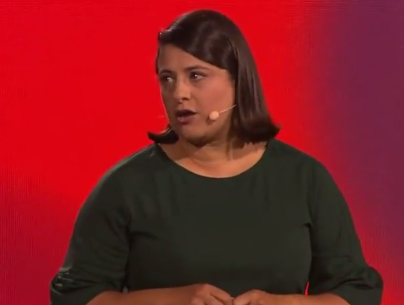Now, there's been some action, too.
現在,人們也已經有所行動。
Over the past decade, six major health care providers and insurers have committed over 600 million dollars to affordable housing,
在過去幾十年,6家主要醫療保健提供商和保險公司已經投入超過6億美元到可負擔得起的住房,
recognizing that it reduces infant mortality and increases life expectancy. But let's be honest.
意識到它可以減低嬰兒死亡率并增加預期壽命。但讓我們坦誠說。
Is our 3.5 trillion dollar health care system fundamentally designed to create health? Absolutely not.
我們那3.5萬億醫藥保健系統根本上是為了創造健康嗎?絕對不是。
Take access to healthy food. Not long ago, a teenage boy shows up at a hospital in Baltimore, losing weight.
拿獲取健康食品來講。不久前,一個十多歲的小孩出現在巴爾的摩一家醫院,身體消瘦。
Just as his doctors are huddled up figuring out which metabolic panels and blood tests to run,
就在醫生聚在一起想要搞清楚要進行哪些代謝功能檢驗和血液測試時,
one of my colleagues asks out loud, "Do you think he might be hungry?"
我一個同事大聲詢問,“你們認為他可能是餓了嗎?”
It turned out that this kid had been kicked out of his housing and literally hadn't had a meal in weeks.
原來結果是這個孩子被趕出了他的房子并且幾周沒吃過飯了。
He said he was "... so relieved that somebody finally asked me."
他說他“終于放心了,有人問我了。”

Somehow, we've created a health care system where asking a patient "Are you hungry?"
曾經,我們創建了一個醫療保健系統,這個系統中會詢問病人:“你餓了嗎?”
is so far outside the bounds of what counts as health care that we mostly fail or forget to ask altogether;
這個問題目前不在醫療保健的范疇之內,以致我們大部分都不會或忘記發問;
where doctors lament a hospital's "no third sandwich policy,"
那里醫生會哀嘆醫院“沒有第三塊三明治政策,”
meaning that if you're a hungry patient in the ER,
意味著如果你是個急癥室的饑腸轆轆的病人,
you can have only two free sandwiches, but as many MRIs as the doctor orders;
你只能有兩塊免費的三明治,但遵循醫囑的核磁共振成像可沒少;
where, in 2016 in the state of Texas, they spent 1.2 billion dollars on the medical costs of malnutrition instead of on access to healthy food;
2016年的德克薩斯州,他們在營養不良的醫療上花費了12億美元而不是提供健康的食物;
where a Centers for Medicare and Medicaid Services program stratifies hungry patients,
醫療保險和醫療補助服務中心對饑餓的病人分門別類,
so that some get access to food and some get information about food,
這樣一些人可以獲得食物,一些人則獲得食物的信息,
with the justification that doing nothing for hungry patients is standard and usual care in this country.
不為饑餓病人做任何事情的理由是這個國家標準和通常的護理方式。
And that's just food. The same is true for housing, electricity ...
而且這還只是食物。同樣的情況也存在于居住、電力...
The bottom line is, health care may be changing, but not by enough and certainly not fast enough.
不論怎樣,醫療保健可能在改變,但還不夠而且顯然不夠快速。
We ask the wrong questions of our doctors, of our patients, but also of our citizens.
我們對我們對醫生,我們的病人,還有我們的公民問了錯誤的問題。
We ask about and argue about health care, but how do voters think about health?
我們詢問并爭論醫療保健問題,但選民們是如何思考健康的呢?











